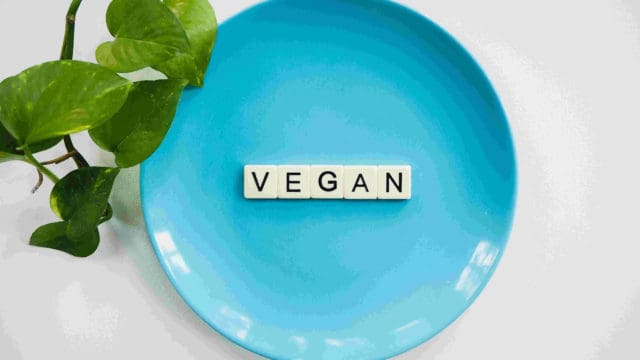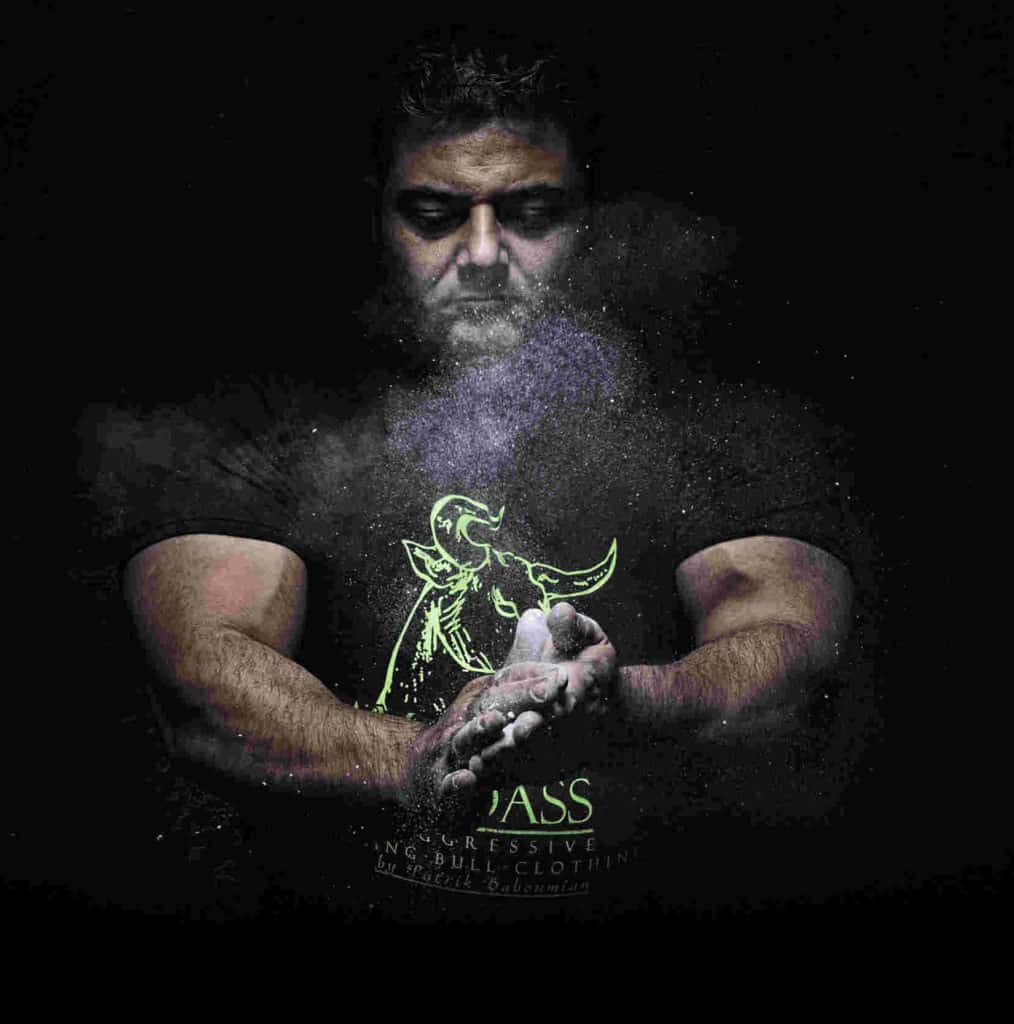
Does veganism and fitness make a strong team?
Do you want to get strong and eat vegan? Some might say it’s not possible! The myth that “meat makes you strong” is a big part of our rhetoric, and many think that cutting animal products from your diet could result in diminished strength, unsatisfying meals and vitamin deficiencies. But that simply isn’t true! A vegetable-based diet is actually great for your health, and extreme sportsman Patrik Baboumian is a fantastic example of this.

As the Strongest Man in Germany he holds two Guinness World Records. He’s also a psychologist and has dedicated much of his time sharing the benefits of a vegan lifestyle through lectures, interviews, books and documentaries.
With his help, we’ve put together a guide which clears up the most commonly-believed prejudices against veganism and fitness and outlines what you should consider when making the change. Plus Patrik has some top nutrition tips to help get you strong, healthy and gym-ready on a plant-based diet.
Myth no. 1
Vegans don’t build muscle effectively
On the contrary, if you eat a diet based on legumes, soya products and nuts, you’ll get all the same benefits as you would from eating meat. That’s because vegetable protein can be absorbed more quickly by the body and thus be converted more effectively into essential amino acids which are crucial to building muscle.
Myth no. 2
Vegan food is unhealthy
This myth can also be put to bed easily, as most vegans are very conscious about their diet and the food they consume every day. While others might not give much thought to what they eat, vegans usually ensure they consume healthy, eco-friendly and wholesome foods. The idea that soy is unhealthy is also untrue. Although some say it’s bad for you, The FDA supports the fact that soy actually reduces the risk of heart disease.
Myth no. 3
To eat a plant-based diet is complicated and expensive
A new vegan might feel a little confused at first. This is mainly due to the fact that they aren’t yet well versed on the subject and aren’t sure what to buy. Of course, vegan food is usually a bit more expensive but only if you resort to substitute products such as imitation meat, vegan cheese, etc. Once you’ve become used to a vegan diet, you’ll require fewer of these substitutes and instead will discover completely new, delicious and exciting alternatives.
Learning about vegan nutrition
Perhaps you’ve decided to change your diet because you want to avoid the inhumane treatment of animals, you want to get fitter, lose weight, build muscle or generally live healthier – whatever the reason, it is essential to learn about nutrition. In this way you can prevent potential vitamin deficiencies and have a ton of energy to channel into sport!
Although cola and chips are theoretically vegan, you don’t have to be a nutritionist to know this isn’t a basis for a healthy plant-based diet. So start looking at nutrition tables and thinking more about a balanced diet.
Positive health effects
Above all, a vegan lifestyle brings your acid levels back into balance. Animal products such as eggs, milk, butter contain a high proportion of sulphur-containing amino acids and these, similar to sugary foods, create an excess of acid in the stomach. In addition, dairy products disturb the absorption of iron which is reflected in low ferritin levels in the blood.
A vegan diet can significantly reduce high blood pressure. Patrik Baboumian, Venus Williams and Lewis Hamilton are top athletes who are convinced their vegan diet increases their performance and contributes to faster regeneration during training breaks.
3 top nutrition tips for vegan athletes
As a sports enthusiast, you might be asking yourself how you can ensure your muscles are supplied with sufficient amounts of protein. Here are Patrick’s top tips:
- Liquid calories
Shakes and smoothies with vegetable protein powder are easy to make and perfect for athletes who want to save time. - Pulses
Make sure you have enough legumes in your diet. If you look at the nutrient content of peanuts they have 25g of protein per 100g which is more than a steak. - Single protein source soy
Due to its high biological value, soya is ideal for ensuring a sufficient supply of protein for active people. Soy also functions perfectly without the need for other protein sources.
If you’d like to learn more about vegan nutrition and sports, just follow Patrik Baboumian on Instagram, subscribe to his YouTube channel or be inspired and motivated to change your diet by watching the Netflix documentary “The Game Changers.”
Are you interested in a healthy diet? Great! Find out how to get rid of your sugar addiction and avoid carbohydrate traps here.



Extremely one-sided post. Please be more careful about giving out such biased opinions to people. This is potentially dangerous advice, and unsolicited one at that, considering that this is a sports community. At least mention all the people and athletes that don’t do well on a vegan diet, because there are quite a lot of them. People can deteriorate on a vegan diet, and no, not everyone who doesn’t do well on a vegan diet just “did it wrong”, as is often argued by vegan advocates. It’s just not a good idea to say that a restrictive diet is universally good for everyone.
I have several problems with this post, apart from the obvious agenda.
I fail to see why “meat makes you strong” is a myth while “soy makes you strong” apparently is true.
The first part of the article is misleading, since it can easily lead readers to believe that Patrik Babouman won his title as a vegan. In fact, he became vegan after he won the title.
An overview on the many anti-nutrients found in plants would also be fair. You mention eggs and dairy products inhibit iron absorption, but I see no mention of broccoli or soy for example, which also inhibit iron absorption.
The claim that “others might not give much thought to what they eat, vegans usually ensure they consume healthy, eco-friendly and wholesome foods” is mildly infuriating too. I would also like to raise the point that it is not possible to maintain a prolonged, widespread vegan diet/lifestyle without promoting monocultures (not eco-friendly at all) and global shipment (also not eco-friendly). Personally, I am not vegan and I buy almost everything local and produce very little waste since I barely buy anything in packaging.
All in all I find this sort of posts very irresponsible. Not everyone has time to do the necessary research around these topics, and someone may end up taking this “well meant advice” at face value and damage their health, especially when they hear it being constantly echoed from all directions.
Hi Liliane,
First of all, thank you for your comment. We are taking all comments seriously, and want to make improvements by critics.
We wrote this article to the best of our knowledge and didn’t mean to give some dangerous advice here. The author has also fundamental knowledge in nutrition and this article was written in cooperation with Patrik Baboumian based on an expert interview about vegan nutrition combined with sports.
Our intention was to point out that the old myths aren’t true and you could be even more successful in the sports you are doing by following a plant-based diet.
Of course, every body works differently and it wasn’t meant to be a “let’s go for it, become vegan” for everybody.
At the same moment, we did mention, that you have to become more engaged with nutrition in general when you want to change your nutrition into a vegan one.
It should be clear that the advices in this article do not replace a medical consultation. If in doubt, please always consult your doctor.
Your Urban Sports Club-Team